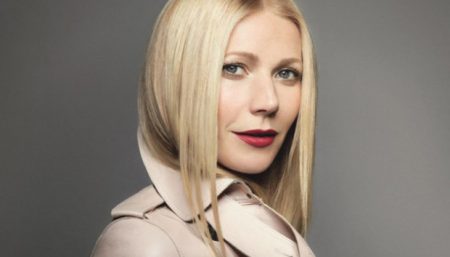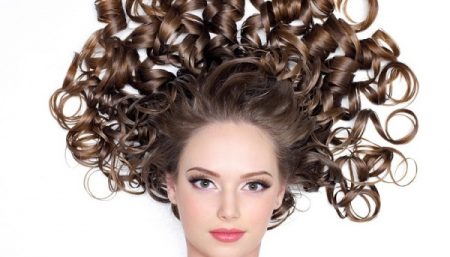With a simple twist here, a hair accessory there, these office-friendly hairstyles will allow you to walk out the door with confidence every Monday thru Friday no matter what hair length or texture you have. These hairstyles will help you exhibit an effortless polished look.
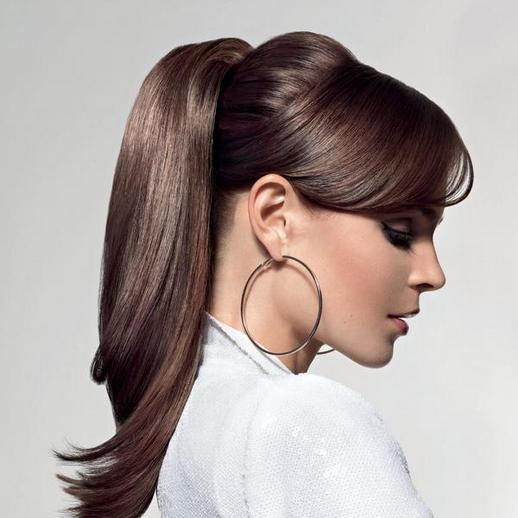
Note: While wearing hair accessories to office may not be advisable, you can still use tic-tacs or bobby pins in a color matching the color of your hair to maintain your hairstyle and keep your hair from falling onto your face all the time. Hair pins with small studs can also be used sparingly. Clutches can also be used to keep your hair in place
- Side-swept Pony: Brush dry hair and gather them behind one ear and binding with an elasticized ponytail holder. Run your fingers lightly over your hair in the direction of the ponytail base to assure that there are no major lumps. Spray your head lightly with hairspray and run a medium-tooth comb gently from the roots to the ponytail base in order to bring unruly hairs into a uniform pattern. When the comb reaches the base of the ponytail, slide it out gently at an angle to keep hair smooth. Curl your ponytail for a flirty look or apply styling pomade for a sleek sophisticated look. As a finishing touch, you can add a ribbon or a band.
- Hair Puff: The raised hair or hair puff popularized by Gwen Stefani and then cemented in our minds by Nicole “Snooki” Polizzi is back! In addition, the hair puff look is also great in making you look a little bit taller than usual.
- Side Braid: Wave your hair first and start braiding very close to the nape of the neck. And keep the ends undone—a dab of styling cream will help break them up. Begin braiding just above the ear. (As for the fishtail technique, simply break the ponytail into two ropes, take a skinny section from the left and add to the right, then repeat to the ends of your hair.) Finish by twisting a section of hair around the end and pinning in place.
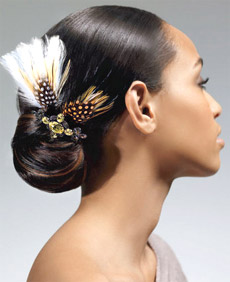 The Corporate Bun: Part your hair on one side and gather your hair into a low ponytail. Twist the ponytail around the base and secure the bun with bobby pins.
The Corporate Bun: Part your hair on one side and gather your hair into a low ponytail. Twist the ponytail around the base and secure the bun with bobby pins.- Half Up Dos: If your hair isn’t stick straight run a flat iron over the ends to really flatten out. Then, apply a strong hold gel to the front and sides of dry hair, and slick all of your face framing hair back. Section off a horseshoe shape of hair from your temples to the back of your crown, and clip up and out of the way for now. Use a comb to smooth back the sides of your hair (just above your ears) and secure each side (just behind your ears) with bobby pins or small clutch that match your hair color.
- Sleek deep side-part: Add some drama with deep, sleek side part. To decide where to place your side part, look straight on in a mirror and make a line up from the outer side of your iris through the arch of your eyebrow. Use a tail comb to create a neat part. Smooth with pomade or hairspray to keep it sleek. Both short & long lenghts of hair look very appealing with deep side partings, you can even use deep side partings to disguise certain annoying feature of your face and hair.
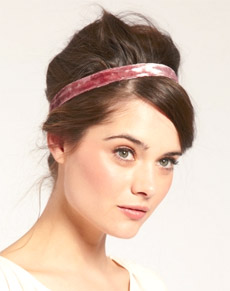 Head Band Bun: Create a side part in dry hair and loosely bobby pin (so hair drapes above one eye) two inches of the side opposite your part behind your ear. Choose a work-appropriate headband and slide it onto the top of your head, covering the pin. Bobby pin the ends of your hair under, to the hair at the nape of your neck (faux bob style) or swoop into a loose bun.
Head Band Bun: Create a side part in dry hair and loosely bobby pin (so hair drapes above one eye) two inches of the side opposite your part behind your ear. Choose a work-appropriate headband and slide it onto the top of your head, covering the pin. Bobby pin the ends of your hair under, to the hair at the nape of your neck (faux bob style) or swoop into a loose bun.- Chignon: Part hair completely down the center and pick a side for the chignon to rest on. Pull hair to one side and create two ponytails, one in each hand. Tie your smoothed-down hair into a loose knot. Wrap one side around to the right and stick a hair pin in to hold. Repeat on the left side and hold with a pin. Finish off with a medium-hold hairspray.
A high ponytail, can perhaps be the best hairstyle for working women around the world!
Related Links
- 2012: the Year for Radical Hairstyles!
- Anytime hairstyling equipment kit
- Backcombing: for that teased option
Disclaimer
The Content is not intended to be a substitute for professional medical advice, diagnosis, or treatment. Always seek the advice of your physician or other qualified health provider with any questions you may have regarding a medical condition.

